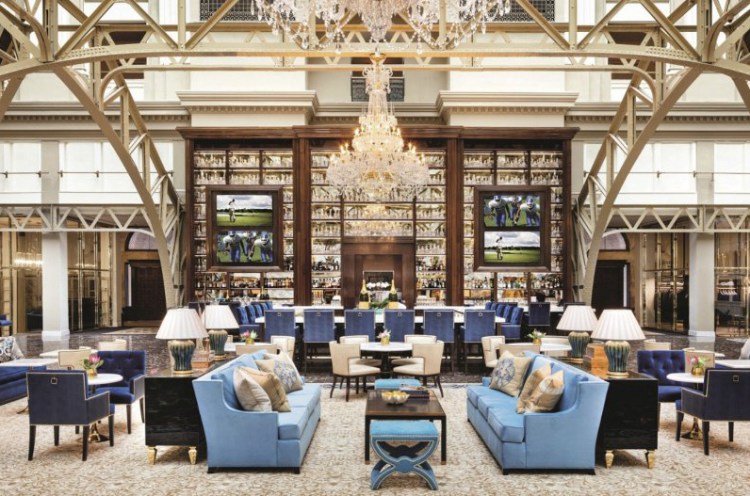A federal appeals court on Friday revived a lawsuit seeking to block President Trump’s hotel in downtown Washington from accepting payments from foreign and state governments.
In a divided decision, the court refused to dismiss the novel lawsuit that accuses the president of illegally profiting from foreign and state government patrons at his D.C. hotel. The case, brought by the top lawyers for Maryland and the District of Columbia, is one of a set of lawsuits alleging the president’s private business transactions violate the Constitution’s anti-corruption emoluments ban.
“We recognize that the President is no ordinary petitioner, and we accord him great deference as the head of the Executive branch,” Judge Diana Motz wrote for a majority of judges. But the court denied Trump’s request to dismiss the lawsuit, saying it would not “grant the extraordinary relief the President seeks.”
The ruling from the full U.S. Court of Appeals for the 4th Circuit is at odds with a decision in March in a separate, similar case that barred individual members of Congress from suing the president over his private business.
The split rulings suggest the Supreme Court will have the final word in the cases involving the rarely tested emoluments provisions intended to prevent foreign and state officials from having undue influence on U.S. leaders, including the president.
At the 4th Circuit, a full complement of 15 judges in December took a second look at the lawsuit from Maryland Attorney General Brian Frosh and D.C. Attorney General Karl A. Racine. An initial three-judge panel of the same court had tossed the lawsuit and said the attorneys general did not have legal grounds, or standing, to sue. But the full court agreed to rehear the case and to decide whether to take the extraordinary step to dismiss it midstream as the president’s lawyers requested.
Unlike past presidents, Trump has retained ownership of his private business and can benefit from it financially. His sons Donald Trump Jr. and Eric Trump run the company.
The emoluments case centers on the president’s hotel on Pennsylvania Avenue in Northwest Washington, where foreign governments, including Saudi Arabia, Kuwait and Bahrain, have booked rooms and events since Trump entered the White House.
Trump’s Justice Department lawyers say the president is not violating the emoluments clauses because the language bars only payments in exchange for official action or as part of an employment relationship.
A District Court judge in Maryland disagreed and interpreted the provisions to ban U.S. officials from accepting any profit, gain or advantage from foreign officials. The judge signed off on more than a dozen subpoenas for Trump’s closely held financial records to determine which foreign and state governments have paid the Trump Organization and how much.
But the subpoenas have been on hold pending the outcome of the president’s appeal.
The pandemic has forced the hotel to nearly close down completely and also put the property back in the news for potential conflicts of interest.
The hotel laid off the vast majority of its staff, a total of 237 employees, according to an April 3 filing with the D.C. government. That does not count staff from the BLT Prime steakhouse, which has also closed.
The hotel continues to operate, but at a small fraction of the occupancy it enjoyed before the pandemic forced economic shutdowns. The drop in business prompted the Trump Organization to inquire with its government landlord, the General Services Administration, and its lender, Deutsche Bank, about how to proceed given the hotel’s lack of revenue.
The president’s son, Eric Trump, who is running the company while his father is in the White House, said the discussions were only preliminary and that he was not seeking any special treatment, but the discussions prompted a number of Congressional Democrats to ask the GSA whether the company was being considered for relief from its rent payments. GSA spokespersons have not responded to requests for comment. Deutsche Bank declined comment.
The Trump Organization also announced in October that the company would try to sell the hotel’s lease and began accepting initial bids in January. It is unclear how many companies pursued the lease, which Trump signed with the federal government before his election. One bidder was Virginia business executive Sheila Johnson, owner of luxury resorts and part owner of the Washington Mystics WNBA team.
In late March, the Trump Organization put on hold the proposed sale of its D.C. hotel lease because of the effect of the coronavirus shutdowns on the real estate industry.
Frosh and Racine have said a sale to an entity other than a state or foreign government would be the end of their case.
In the separate case at the U.S. Court of Appeals for the D.C. Circuit, Democratic members of Congress led by Sen. Richard Blumenthal (D-Conn.) and Rep. Jerry Nadler (D-N.Y.) have decided not seek rehearing by a full complement of judges. The lawmakers have until July to decide whether to ask the Supreme Court to review the three-judge panel decision, which blocked individual members of Congress from trying to enforce the foreign emoluments clause.
Send questions/comments to the editors.



Success. Please wait for the page to reload. If the page does not reload within 5 seconds, please refresh the page.
Enter your email and password to access comments.
Hi, to comment on stories you must . This profile is in addition to your subscription and website login.
Already have a commenting profile? .
Invalid username/password.
Please check your email to confirm and complete your registration.
Only subscribers are eligible to post comments. Please subscribe or login first for digital access. Here’s why.
Use the form below to reset your password. When you've submitted your account email, we will send an email with a reset code.